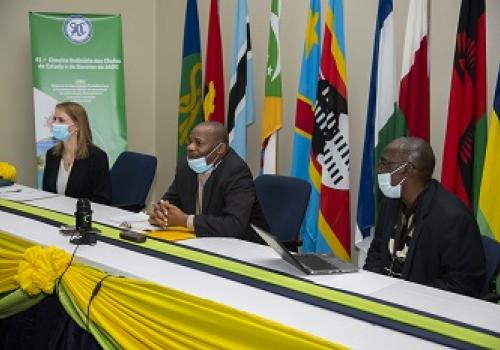The Southern African Development Community (SADC) is making steady progress on its programmes to facilitate industrial development, finance and investment and trade in goods and service among Member States. This emerged out of the Trade, Industry, Finance and Investment (TIFI) Thematic Group hybrid meeting held on 16 June 2022 to discuss progress on the implementation of its programmes to deepen regional economic integration.
According to a joint update from the SADC directorates of Finance, Investment and Customs and of Industrial Development and Trade, 25 percent of the 64 outputs or deliverables from the TIFI Multi-Year Action Plan 2021-2023 have been completed with support from International Cooperating Partners (ICPs) such as the European Union, Deutsche Gesellschaft für Internationale Zusammenarbeit (GIZ) GmbH (GIZ), World Bank and the African Development Bank (AfDB).
A further 70 percent of milestones are on course in being attained, while only five percent of target projects have not made progress since November 2021 due to various challenges that are being addressed. The highest number of completed outputs are under the cluster on Industry and Standardisation, Quality Assurance and Metrology (SQAM) where nine deliverables have been attained out of the 28 set out in the action plan. This is followed by a second cluster focusing on Macroeconomic Convergence, Finance and Investment where four deliverables have been completed out of 18. The remaining 14 deliverables are at various stages of implementation. Three deliverables under the third cluster on Trade and Customs have been attained while 14 others are ongoing. Work is yet to commence on only one output under this cluster.
Among the deliverables attained are the development of the SADC Simplified Trade Regime (STR) for small cross border traders. The STR framework aims to reduce barriers to trade by simplifying the customs procedures and processes. Its implementation will support small traders by lowering transaction costs associated with formal trade.
Another milestone achieved is the operationalisation of the SADC e-Certificate of Origin (e-CoO) framework. The pilot phase of the programme is being implemented in Botswana, Kingdom of Eswatini, Malawi, Mauritius, Mozambique, Namibia, Lesotho, South Africa, United Republic of Tanzania and Zambia. The e-CoO framework aims at enabling traders to apply for the certificate of origin electronically. This will reduce time for its issuance and transmission to the importing country. The regional e-CoO will also enhance integrity of customs and trade operations as a result of less interference with human beings.
The SADC Strategy on Financial Inclusion and SMEs Access to Finance was reviewed and being domesticated as part of the implementation of the action plan. This has seen Member States, such as Angola, Botswana, Eswatini, Malawi, Namibia and Tanzania developing their own financial inclusion strategies or national roadmaps on financial inclusion. Among the TIFI action plan deliverables that are on course of being attained is a review of the SADC Protocol on Finance and Investment to take into account emerging regional issues such as industrialisation, infrastructure development and financial inclusion. A regional study is underway to assess the implementation and the relevance of the Protocol in light of the new regional dynamics. The study is expected to be completed this year and will result in the development of a roadmap for deeper financial and investment integration.
Another milestone where the region is making progress is the operationalisation of the SADC Regional Development Fund (RDF). So far nine Member States have signed the Agreement on the Operationalisation of the SADC Regional Development Fund although none of them has deposited instruments of ratification with the SADC Secretariat. The SADC Secretariat is currently undertaking two studies, one of which aims to recommend modalities for the proposed Fund such as the operating policies and guidelines as well as the financing structure and business plan. The second study seeks to develop financial instruments to support SADC integration projects at regional and Member States levels, including options for disaster risk financing.
Significant progress has been made towards the development of a SADC Investment Climate Scorecard whose objective is to improve the investment and business environment in the region to foster regional integration. With support from the EU, World Bank the Organisation for Economic Cooperation and Development, Member States are developing the scorecard covering 22 economic sectors as part of a process expected to be completed later this year.
The Protocol on Trade in Services entered into force on 13 January 2022 following the deposit of instruments of ratification at the Secretariat by Malawi. The submission by Malawi enabled the threshold of ratification by two-thirds of Member States set by the Protocol for its entry into force to be met. Sector studies have been finalised on business, health and educational services while work is ongoing to assess the situation with regard to three other sectors.
Under the Support Towards the Industrialisation and the Productive Sectors in the SADC Region (SIPS) that is jointly supported by the EU and GIZ, SADC is developing a framework and guidelines for the integration and effective participation of micro, small and medium enterprises in regional value chains. SIPS aims to improve the performance and growth of selected regional value chains and related services within the agro-processing and pharmaceutical sectors in the SADC region. Work is also ongoing on the mapping and analysis of the four selected agro-processing value chains of cotton, rice, soya and wheat in order to support evidence-based value chain development by different stakeholders in the region. This is crucial for promoting value-added agro-exports.
Another SIPS-supported activity was the development of the Regional Leather Model Policy Framework, which has been completed and will be tabled for consideration by Ministers in July 2022.

